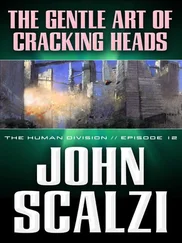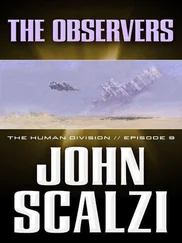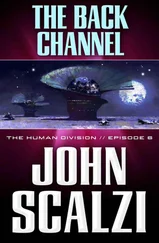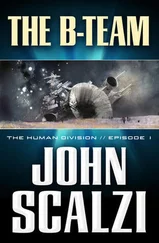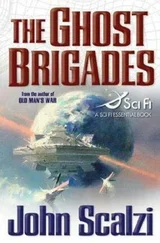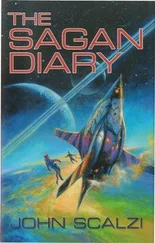"This is ridiculous," Heffer said. "No court is going to rule that a sentient being is property. And whether you choose to call her 'it,' or not, Mr. Ambassador, there's no doubt she is a sentient being."
"No doubt at all, Mr. Secretary," Narf-win-Getag said. "However, you are once again-—and I beg your pardons-incorrect in your assumptions. Humans are relatively new to the Common Confederation, which existed before your species was scratching pictures of bison into cave walls. There have been Common Confederation courts of law for just as long. And while it may be unfamiliar to you, there is indeed case law supporting our claim. I refer you to Agnach Agnach-u v. Ar-Thaneg Corporation, adjucated in the CC annulis 4-3325. I believe that would have been right around the time your Hammurabi was handing down his code."
"Ben?" Heffer looked over to Javna.
"I remember it from law school," Javna said. "It's a canonical intellectual property case. If I remember correctly, Agnach-u was a programmer of some sort, and developed a program it claimed was sentient. Ar-Thaneg was its employer and claimed the program as work product, but Agnach-u claimed that since it was sentient, Ar-Thaneg couldn't own it. The courts ruled against Agnach-u. But I don't know that it's on point. The property in question was software, not genetic material, and there was never agreement as to whether the program was sentient or not. It passed some tests but failed others. As a precedent, it's a reach. It's a long reach."
"Not so long a reach as your assistant would have you assume, Mr. Secretary," Narf-win-Getag said. "The ruling is neutral on the issue of the nature of the property. It doesn't matter what the property is, merely that it is property. The ruling ultimately was awarded to Ar-Thaneg on the grounds that as the property on which the program was created was owned by Ar-Thaneg, Agnach-u had no standing to bring the suit in the first place."
"In other words, it was awarded to Ar-Thaneg on a technicality," Javna said.
"Indeed," Narf-win-Getag said. "But for the Nidu, a very useful technicality, as it's clear DNA belongs to us."
"There's the matter of the human DNA, which does not belong to you," Heffer said.
"As I've mentioned before, the treaty between Nidu and Earth doesn't address how the DNA is used, merely the circumstances in which the DNA belongs, unambiguously, to my government. I assure you, Mr. Secretary, that if you can find a way to extract the human parts of the entity and let us keep part, then you are welcome to the human portions."
" 'Take thou thy pound of flesh, but in the cutting it, if thou dost shed one drop of Christian blood, thy lands and goods are confiscate,'" Heffer said.
"Pardon, Mr. Secretary?" Narf-win-Getag said.
"The Merchant of Venice," Heffer said. "A play by Shakespeare. The character Shylock strikes a bargain to take a pound of flesh from another man, but if he spills the man's blood by doing so, he loses everything. It's the story of another crisis brought on by a contractual dispute, Mr. Ambassador."
"How droll," Narf-win-Getag said. "I must see it sometime. But I must impress on you, Mr. Secretary, that a crisis is indeed what this is. The agreement concerning sheep is nestled within a larger and more comprehensive treaty between our two peoples, a treaty which is the primary document concerning relations between our nations—the document at the heart of our peoples' friendship. If the courts rule for Nidu, and you cannot or will not produce the entity, then the UNE will be in violation of the treaty. The government of Nidu will then have the right to declare all agreements associated with the treaty null and void, and sue for renegotiation. Nidu is by far the Earths largest trading partner and military ally, Mr. Secretary. I don't have to tell you what sort of impact the renegotiation of our friendship will have on Earths economy and its standing and security within the Common Confederation. And I hate to think what it will do to your government."
"Mr. Ambassador," Heffer said. "Are you aware that this morning six of Nidu's destroyers went into n-space near simultaneously?"
"Is that so?" Narf-win-Getag said, mildly.
"That's an unusual occurrence. And provocatively timed, considering this suit here," Heffer said. "If you don't mind me saying so, Mr. Ambassador, destroying a decades-old friendship between our nations on account of one person seems to be an excessive reaction."
"I can't tell you how pleased I am to hear you say that, Mr. Secretary," Narf-win-Getag said, and rose from his seat. "Hopefully such a sentiment on your part means that you will be motivated to reacquire our lost sheep, and we can all move forward without further distress to our long and intimate friendship. In the meantime, however, and purely as a precaution, our lawsuits are moving forward. Given the extreme time sensitivity of the suit, I would imagine that we'll get the hearing expedited—in fact, I wouldn't be entirely surprised if there's a preliminary hearing by this time tomorrow morning. And so, I leave you to prepare. Mr. Secretary, Mr. Javna. Good day."
"The Merchant of Venice?" Javna asked, after Narf-win-Getag had left.
"I did drama in college," Heffer said. "So sue me. And tell me you know where this woman is."
"I know she was with Harry at the Arlington Mall last night," Javna said.
"Oh, yes, the Arlington Mall," Heffer said. "Which reminds me to let you know how delightful it is to have Arlington County Police and the US and UNE FBI and the DC Port Authority Security Agency banging down our door asking why a State Department employee was involved in a public shootout. Not mention every media outlet from Boston to Miami."
"I'm sure the other guys started it," Javna said.
"This isn't funny, Ben," Heffer said. "And it's getting less funny by the minute. You said that this Creek fellow would handle everything under the radar. Shooting up the Arlington Mali and killing people is not under the radar."
"All the eyewitness reports say that Harry wasn't the one who started shooting," Javna said. "Whatever happened, he was defending Robin Baker. He was working under the radar. Whoever is working against us were the one to made mis happen."
"You don't have any idea where he is now. Where they are now," Heffer said.
"No," Javna said. "I left him a message to get low last night and told him to wait until I sent for him."
"Well, try locating him now, if you don't mind," Heffer said.
Javna pulled out his communicator and tried to connect. "It's no good. The system says his communicator is off the system, and I'm getting no response from his home connection. I would imagine all his equipment has been impounded by the police."
"No messages?" Heffer asked.
"I'll check," Javna said.
Heffer's executive assistant entered the room with a blue slip of paper and handed it to Heffer.
"We've got a court date," Heffer said. "Bright and early tomorrow morning at eight forty-five. I want you to handle this, Ben. Time to exercise that law degree of yours. Dig up what you can on this precedent and then bury that lizard with it. 'Hammurabi,' my ass."
"Odd," Javna said, still looking at his communicator.
"What?" Heffer said.
"I just got a text message from Dave Phipps over at Defense," Javna said. "He wants to have lunch and discuss 'our mutual friend.'"
"You don't have mutual friends?" Heffer said.
"I try not to have mutual friends with him," Javna said.
"You should have lunch with him," Heffer said.
"Yeah, I should," Javna said. "And double up on the antacid."
* * * * *
"Here you go," Dave Phipps said, handing Javna his hot dog.
"Thanks," Javna said, taking it. "You know, Dave, the Defense Department pays hundreds of dollars for hammers and toilet seats. It seems like it should be able to spring for something more than a hot dog from a stand on the Mall."
Читать дальше


